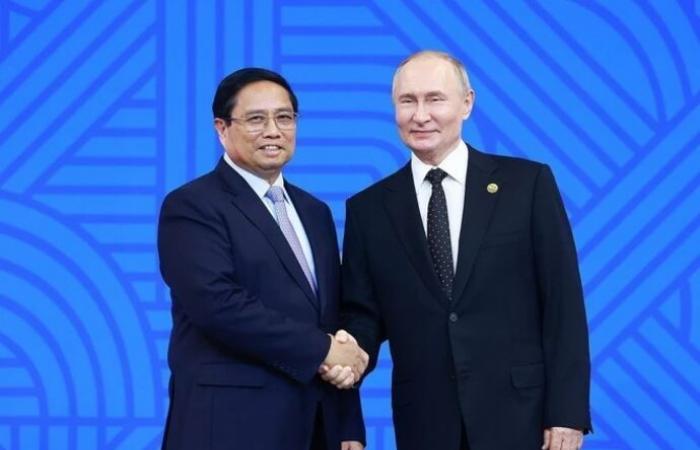>> A new phase of development for Vietnam – Russia relations
>> The next visit of the Russian PM to Vietnam would create a new dynamic
Evaluating the results of cooperation between Vietnam and Russia in recent years, the Dr. Koldunova, associate professor of Oriental studies, noted that the two countries have worked tirelessly to restore trade volume to pre-2022 levels, achieving this goal by the end of 2024.
| Russian President Vladimir Putin (R) welcomes Vietnamese Prime Minister Pham Minh Chinh to the 2024 BRICS Summit. |
| Photo : VNA/CVN |
The Dr. Koldunova highlighted that Vietnam and Russia are exploring new opportunities in finance, economics and logistics to further promote bilateral trade. Several new logistics routes have been established, connecting the Russian Far East region with Vietnam, creating opportunities for Russian companies to actively engage in trade activities.
Regarding investment cooperation, the Dr. Koldunova highlighted that Vietnamese companies such as TH True Milk continue to operate successfully in Russia, while the energy sector has seen the launch of numerous joint investment projects and production collaborations.
Regarding the potential for future cooperation, she highlighted that agriculture and agribusiness are key areas of mutual interest. Vietnamese products are gradually filling the void left by the exit of Western companies from the Russian market. In addition, energy remains a traditional sector of cooperation between the two countries, she added.
The Dr. Koldunova also highlighted that Vietnam’s rapid economic growth post-COVID-19 has led to substantial demand for energy. Russian companies, which have traditionally invested in resource exploitation in Vietnam, are exploring new forms of cooperation, including production partnerships, and may consider relocating some production processes to Vietnam, following the practices of American and Chinese companies.
She suggested that Vietnam focus on sectors vacated by Western companies in Russia, particularly creative industries, light industry and fashion, which are areas with high development potential in Vietnam.
The Dr. Koldunova expressed confidence that the recent decision by Vietnam’s National Assembly to revive the Ninh Thuan nuclear power plant project reflects Vietnam and Russia’s commitment to achieving carbon neutrality and moving towards a green economy.
Despite the suspension of the Ninh Thuan nuclear power plant project ten years ago, she noted that Vietnam and Russia have maintained cooperation through the creation of a scientific center focused on nuclear technology. This constitutes a solid basis for relaunching the project.
The Dr. Koldunova said she hoped that Vietnam and Russia would establish a major joint project that would strengthen not only bilateral cooperation in the coming years and decades, but also the long-standing good relations between the two countries.
VNA/CVN






